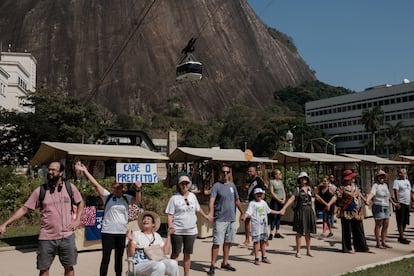The heart-pounding zipline of discord in Rio de Janeiro
Plagued by legal problems and public protests, construction of this attraction on Sugarloaf Mountain has been halted by court order

The silhouette of Rio de Janeiro’s iconic Sugarloaf Mountain is instantly recognizable, as is the giant Christ the Redeemer statue on a nearby hill. A visit to the two sites, connected by a century-old cable car, is a must for every tourist. Atop Sugarloaf Mountain, visitors are greeted with a breathtaking panorama of the ocean, Guanabara Bay, and the city nestled between lush mountains covered by tropical jungle. More adventurous tourists may soon be able to experience this landscape in a whole new way by soaring through the air on heart-pounding ziplines that can reach speeds of up to 50 miles per hour (100 kph). It’s a vision developed by the company that manages the park, but many local residents have protested that it would mar the natural beauty of Rio de Janeiro’s vistas.
To construct the platforms for accessing the zipline, a significant amount of rock has been excavated from the top of Sugarloaf and the adjacent crag of Urca. “What they’re doing is causing irreparable harm, because the rock just doesn’t regenerate,” said Julio Mello, one of the spokespersons for those who oppose the zipline. Concerned residents, climbers and environmentalists swiftly rallied together and released a manifesto with 27,000 signatures. While the project had been approved by the city council and other authorities like the National Historical and Artistic Heritage Institute (IPHAN), the attorney general launched an investigation of alleged irregularities. As a result, the construction was stopped, leading to scrutiny of those who approved the project.
Critics argue that the zipline is part of a larger project that aims to expand commercial space on the mountain peaks, areas that already house an auditorium, bars, souvenir shops and even jewelry stores. During a recent protest, demonstrators symbolically embraced Sugarloaf Mountain to highlight its protected natural monument status for the past 50 years. This status prohibits any further construction. The opposition appears to be winning this battle since work on the project was halted in late June by an appeals court judge, Luiz Paulo da Silva Araújo Filho, who said the project “poses a risk to society, since the drilling and removal of rock cannot be restored.”

The company that manages the facility, Parque Bondinho Pão de Açúcar, is hoping for a favorable decision by the court in September. The zipline will cost approximately $10 million (€9.2 million) and its promoters argue that the protests are unfounded. According to Sandro Fernandes, the company’s director, the zipline platforms will utilize areas with existing construction and previously unused spaces. “Yes, some rock has been removed, but we have also taken out some cement,” he said. He confirms that only 14 trees were cut down, but many more have been planted to compensate. He also said the new construction mostly entails ramps to improve accessibility for individuals with reduced mobility.
Fernandes bristles at accusations that the project will overtax the mountain, and says they are not trying to bring in more visitors because the infrastructure can’t handle it. The park already welcomes over 1.5 million visitors annually, making it the third most popular tourist spot in Brazil, after Christ the Redeemer and Iguazú Falls. Fernandes thinks the protests and legal setbacks damaged Rio’s reputation, caused legal uncertainty and created an unnecessary controversy. “What they’re doing is just delaying development... I mean, can you imagine Paris without the Eiffel Tower? That was also controversial when they built it,” he said. However, he acknowledges that the company does have long-term plans to take the park to a new level. With no specific timeline yet, these improvements would expand the top of Sugarloaf by over 1,500 feet (500 meters), although Fernandes says the visual impact will be kept to a minimum. The focus is on improving tourist facilities without adding shops and restaurants. Still, opponents of the zipline remain skeptical.
“The beauty of this place and its magnitude, it just asks one thing — take a moment to appreciate it. Don’t treat it like some hyperactive amusement park or something,” said Claudio Pfeil, a resident of the Urca neighborhood. Locals are quick to note that the company has previously attempted various expansions, including extending the cable car to Copacabana Beach and constructing an amphitheater and children’s playground in the valley between the two hills. However, all these projects failed due to public opposition.

UNESCO has also been pulled into the controversy. Rio de Janeiro’s unique landscape has been a World Heritage Site since 2012. UNESCO even created a specific category for this remarkable city — urban cultural landscape — which helps safeguard Rio’s iconic mountains, as any manmade changes could jeopardize the special designation. Sugarloaf Mountain is a geological wonder — a nearly 600-million-year-old granite formation and relic from when Africa and America were a single land mass. In 1565, Portuguese settlers picked a beach at its base to found the city of São Sebastião do Rio de Janeiro.
In April, the Brazilian delegation of the International Council on Monuments and Sites (ICOMOS), a UNESCO-affiliated advisory body, strongly urged for the immediate cancellation of the building permits for the zipline. They expressed surprise and firm opposition to construction on the mountains, going so far as to describe it as “mutilation.” UNESCO said it was closely monitoring the situation and has requested more information from Brazilian authorities. It intends to bring the matter to the World Heritage Committee if a resolution is not reached, which will then decide whether to withdraw World Heritage Site status. Only a few places have lost the designation, including a sanctuary for the Arabian Oryx in Oman, the Elbe Valley in Germany and the city of Liverpool, England.
Sign up for our weekly newsletter to get more English-language news coverage from EL PAÍS USA Edition
Tu suscripción se está usando en otro dispositivo
¿Quieres añadir otro usuario a tu suscripción?
Si continúas leyendo en este dispositivo, no se podrá leer en el otro.
FlechaTu suscripción se está usando en otro dispositivo y solo puedes acceder a EL PAÍS desde un dispositivo a la vez.
Si quieres compartir tu cuenta, cambia tu suscripción a la modalidad Premium, así podrás añadir otro usuario. Cada uno accederá con su propia cuenta de email, lo que os permitirá personalizar vuestra experiencia en EL PAÍS.
¿Tienes una suscripción de empresa? Accede aquí para contratar más cuentas.
En el caso de no saber quién está usando tu cuenta, te recomendamos cambiar tu contraseña aquí.
Si decides continuar compartiendo tu cuenta, este mensaje se mostrará en tu dispositivo y en el de la otra persona que está usando tu cuenta de forma indefinida, afectando a tu experiencia de lectura. Puedes consultar aquí los términos y condiciones de la suscripción digital.








































